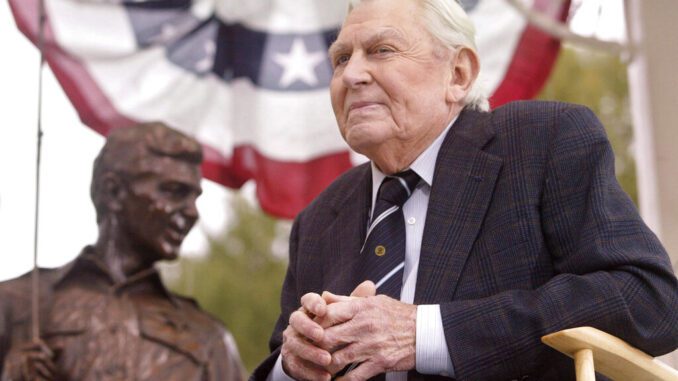
My recent experience with a cold and sore throat left me with more than just an opinion on the rising cost of Robitussin. Contrary to the prayers of a few of my liberal friends, I tested negative for COVID and every other serious disease for which they salivated.
My time in bed allowed me the luxury of reading and watching some old movies. I watched Andy Griffith’s amazing performance in the 1957 film “A Face in the Crowd.” He played Larry “Lonesome” Rhodes, an egomaniacal country “bumpkin” who used his talent and his understanding of working-class rural voters — whom CNN calls Trump voters — to manipulate the electorate in favor of a corrupt senator seeking the presidency.
What is clear from the movie is not just that a comedian from North Carolina had an acting depth for which, even as his career progressed, few gave him credit. What is of greater interest is that, even in 1957, the sophisticated Hollywood class feared the working class — even as they claimed to champion its cause. The elitists were scared that “the people” might find a leader who would expose their sophisticated monopoly over politics and popular culture. It was a movie created to stoke the fire of fear in a nation already filled with the fantasy that war with the Soviets was either necessary or inevitable.
“A Face in the Crowd” portrayed Lonesome Rhodes as an evil charlatan with a familiar “down home” accent. His supporters were portrayed as simpletons. The plot followed the simpletons’ affinity for the charlatan only when the latter praised their guns and Bibles. In short, this movie appeared to be the source from which the 21st Century Democratic Playbook was plagiarized.
Its message was that people who loved God and owned firearms were idiots ready to be exploited by colluding “confidence” men, “domestic enemies” who would subvert our fragile democracy. That is why, when it came to the important things like government, the working class should “defer to their betters.” Those “betters” were the culture class found only in Hollywood, Manhattan and, now, at the Obama Estate on Martha’s Vineyard.
As it dehumanized the simpletons, “A Face in the Crowd” became a precursor to Hillary Clinton’s quest to delegitimize the “deplorables.” It was the antecedent to Joe Biden’s war on “domestic enemies” — meaning, among other things, those with whom the “woke” disagreed.
Yet, is it all their fault? The era which created “A Face in the Crowd” also created America’s first peace-time concept that other Americans could be labeled “domestic enemies.” The concept of “war” had never before been activated for the purpose of “cancelling” a segment of citizens who were merely intellectually out of favor with the power elite. But, in the 1950’s, the concept took hold.
Today, we refer back to it as “McCarthyism.” Today, we call it “cancel culture.” What America witnessed then it witnesses now. It is and was the social disenfranchisement of a certain population, a process in support of cultural extermination.
Those who followed Lonesome Rhodes were supposedly the pawns of a demagogue. So, it made sense to exclude them in order to preserve democracy. It was a virtue, not a sin, to fire an employee who supported Donald Trump, who was unvaccinated or who had the audacity to suggest that there were only two genders. The message was and is that these retrogrades were and are “domestic enemies.”
Maybe it is time to retire the term “enemies foreign AND DOMESTIC” from our pledges and our oaths. In the 1950’s when pro-McCarthy director Elia Kazan created “A Face in the Crowd,” it was easy to differentiate friend from foe. Television, most movies and the way we discerned life was still predominantly black and white, good and evil, right and wrong. Some conservatives even cheered when Kazan and the House Un-American Activities Committee (HUAC) imprisoned Dalton Trumbo. But that only became its own antecedent for today’s Adam Schiff and his “new HUAC.”
In truth, America has no “domestic enemies.” It has only people, who, on any given day, the power elite don’t like. The crucible of the enemy, if one exists, is neither in the politics of Charlie Chaplin nor the office of Donald Trump.
Shakespeare, Cassius and Edward R. Murrow were right. In our crowd, the enemy is “not in the stars, dear Brutus but, within ourselves.”
